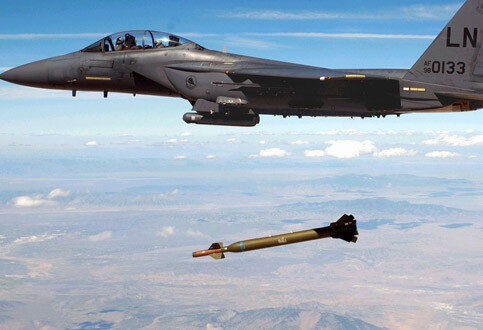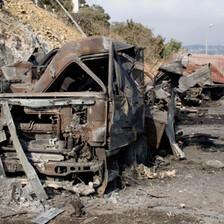Electronic Lebanon 31 July 2006

The cargo, GBU28 bombs contain 630lbs (285kg) of high explosives and were developed by the US for use in the first Gulf War. The first sale of the GBU28 outside the US was the shipment of 100 units to Israel, authorised in April 2005.
Israel has accused both Syria and Iran of providing rockets and missiles to Hezbollah. Israel’s prodigious military power is sourced primarily to the United States with the help of Britain. Recently the US has asked the UK government to let two cargo planes with missiles and bombs on board stop at Prestwick airport in Scotland. However, protesters and some UK MPs are furious with the US for breaking the rules governing the transit of arms through British airports.
Nearly 600 civilians, mostly women and children, have been killed in the Israeli aggression that began more than two weeks ago in Lebanon and displaced about 750,000 people.
Yesterday, Israel’s airforce carried out a bloody strike on the Lebanese village of Qana Sunday, killing at least 60 civilians, including 37 children. The Israeli attack destroyed several houses and a three-storey building where about 100 civilians were sheltering. Last week Israel bombed and shelled a UN observer post for several hours, despite protests, until an aerial bomb smashed a bunker in which international military observers were sheltering, killing all four. Israeli aircraft have also attacked Red Cross ambulances and civilian vehicles attempting to comply with Israel’s orders to flee their homes. In the worst such incident 20 people were killed in a single air strike on a convoy fleeing the village of Marwaheen.
Under British rules governing arms exports, military equipment should not be used for internal oppression or external aggression. UK MPs called on Foreign Secretary Margaret Beckett to ensure that arms made in Britain were not being used in Israel’s war on Lebanon, amid warnings that Israeli F-16 warplanes flying sorties across the border may contain British parts.
Scotland on Sunday revealed that after the conflict in Lebanon began three weeks ago, Ireland turned down a United States request for planes carrying 600lb so-called bunker busters to refuel at Shannon airport in Co Clare. The two aircraft that landed at Prestwick last weekend had been designated as “civilian flights.”
On July 27, Pentagon spokesman Bryan Whitman told the press that the Defense Department found no policy or procedural violations. The Defense Department conducted the review because of press reports pointing to US violations of bilateral agreements by speeding up shipments of bombs and other military equipment to Israel. “We found no deviations,” Whitman said.
The row has intensified over the past few days as two further Boeing 747s carry military goods from Texas to Tel Aviv and have been given authorisation to land at Prestwick. The cargo, GBU28 bombs contain 630lbs (285kg) of high explosives and were developed by the US for use in the first Gulf War. The first sale of the GBU28 outside the US was the shipment of 100 units to Israel, authorised in April 2005.
The US administration has been rushing deliveries of these bombs to Israel. According to The New York Times the munitions that the US is sending to Israel are part of a multimillion-dollar arms sale package approved in 2005 “Israel is able to draw on as needed.” The arms shipments were not announced publicly. Officials have declined to describe in detail the size and contents of the shipments to Israel but an announcement in 2005 that Israel was eligible to buy the “bunker buster” weapons described the GBU-28 as “a special weapon that was developed for penetrating hardened command centers located deep underground.” The document added, “The Israeli Air Force will use these GBU-28’s on their F-15 aircraft.”
In the period between 1997 and 2004 Israel has been supplied with a total of 8.4 million dollars of arms deliveries, with 7.1 billion dollars or 84.5 percent coming from the US. A major factor in this was the rise in U.S. Foreign Military Financing (FMF) — outright U.S. grants to Israel — which now totals about 2.3 billion dollars a year paid for by U.S. taxpayers. According to US regulations, 74 percent of this assistance to Israel must be spent on US military goods. The FMF aid has now become the main source of supplying Israel’s major arms procurements. FMF assistance to Israel represents 23 percent of Israel’s overal defence budget. This assistance is expected to increase by 60 million dollars a year to a level of 2.4 billion dollars by 2008 compared with 2.2 billion dollars in 2005.
The shipments to Israel continue despite US arms control laws that require military items transferred to foreign governments by the US be used solely for international security and legitimate self-defence. Israeli attacks against Lebanon’s civilians clearly go beyond legitimate self-defence. The international legal limit to self-defence is that the act justified by the neccessity of self-defence must be limited by that necessity, and kept clearly within it.
Meanwhile both the US and the UK are not rushing Israel into a ceasefire.
Arjan El Fassed is a co-founder of The Electronic Intifada and Electronic Lebanon.
Related Links




